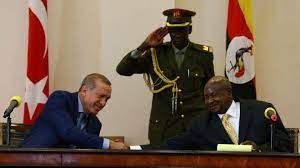The third summit between Turkey and Africa which opened in Ankara on Friday provides an opportunity for host president Recep Erdogan to affirm his country’s clean breakthrough on the African continent.
By Cheikh Diop
Guaranteeing a presence in all spheres, a series of cooperation deals signed in recent years, and an influence growing steadily in Africa, Turkey has become in a short time a strategic partner for the continent.
Aware of the economic and geopolitical stakes, Turkey wants to further assert itself on the African continent with this third summit, which will bring together some forty senior African officials, including thirteen heads of state.
For two days (December 17 and 18), Africa has been in the spotlight with themes on economy and security.
In troubled relations with some European powers and faced with the fall of the Turkish lira since the beginning of the year, the President Erdogan was keen to take advantage of the summit with his African peers to expand his sphere of influence and especially to give a second wind to his economy.
In recent years, the continent has become his favorite terrain since his aborted dream of joining the European Union.
Erdogan has made some forty visits to Africa as Prime Minister and President of Turkey, often with business leaders in his entourages to forge partnerships.
The strong man of Ankara thus unveils his open-door policy towards the continent by forging solid links with several heads of state.
Economy and security on the spotlight
Economically, Turkey’s industrial presence in Africa can be measured in the infrastructure, energy, textile, machinery, furniture, household appliances and mining sectors.
According to official Turkish data, Africa today represents 21 percent of the turnover of Turkish entrepreneurs who have earned $65 billion in cumulative value from 150 projects carried out in various African countries.
Like the great powers who view Africa as the continent of the future, Turkey is constantly spreading its tentacles on the continent.
Turkey has witnessed a rise in economic might accompanied by a very active diplomacy.
From 2009 to date, the number of diplomatic representations has increased from 12 to 42, development aid has been significantly increased and its national carrier Turkish Airlines, which served only four African destinations in 2008, now offers 51 destinations in 33 countries on the continent.
In terms of security, Ankara is counting on its combat drones and military equipment at lower cost to open up more leeway to the African market during the summit.
This is an opportunity for the fourth European military power to promote its arsenals to African countries with more flexible and attractive conditions for their acquisition.
The objective of the “reis” (chief in Turkish), is to validate its new five-year programme with Africa at the end of the summit.
A new roadmap should allow Turkey to double its trade (25.3 billion in 2020) with Africa to reach the 50 billion dollar mark.
CD/lb/as/APA


